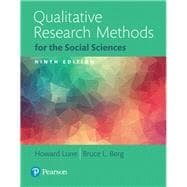For courses in Research Methods in Political Science and Sociology, and in Qualitative Research Methods
Raising questions, rather than giving answers
Qualitative Research Methods for the Social Sciences is written with the recognition that different researchers in different fields each bring their own needs and intentions to the process. Howard Lune and Bruce Berg aim to guide the reader through the process of research planning, carrying out one’s projects, and making sense of the results. Each chapter provides examples of the best and worst approaches to the kinds of questions that arise with each form of research, as well as discussions of what makes an approach successful or not. Like its predecessors, the Ninth Edition stresses the importance of ethics in research and respect for subjects.
NOTE: This ISBN is for a Pearson Books a la Carte edition: a convenient, three-hole-punched, loose-leaf text. In addition to the flexibility offered by this format, Books a la Carte editions offer students great value, as they cost significantly less than a bound textbook.










